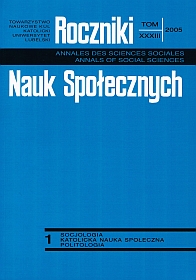Normy ethosu nauki a realia ekologiczne pracy naukowej
Abstrakt
Scientists’ professional work is a style of using the freedom of receiving and transmitting the word because of striving after the truth typical of the ‘scientific perspective of the world’. The use of such freedom is revealed by the researcher’s definition of himself: he is the one who has the duty of joining criticism with conceptualism; objectivity with rationalism; ‘disobedience in thinking’ with being careful about ‘sovereignty of the thought’; taking care of the functioning of a lot of ‘research programs’ that compete with each other with care of polyphony in scientific discussions. The characteristic of the style of research work is combined with the characteristic of the scientist as an actor playing social roles in the professional circle. The scientist uses the freedom that he needs as a professional-specialist doing his work within the frames of a special kind of institution. Taking into consideration the existence of ‘the Great Science’ and ‘a mass man in science’, we are dealing here with conformation of the scientist as one who wants to use this kind of freedom. We are talking here about the difficulty of exacting respect for the norms of the ethos of science from scientists. This is connected with constant conflicts in the circle of scientists that originate from different ways of understanding and treating those norms. Ecological realities of the scientific work only to some extent favor practicing the profession of the scientist in the proper way. In many respects those realities seriously hinder the proper use of the freedom to receive and transmit the word because of the truth of the scientific type. The realities of the order of scientific search and consideration; the realities of the scientists’ circle; the realities of the world surrounding the scientists’ circle along with its institutions are all significant here. Hence it is important, in our present time, to be faithful to the fundamental dictates to think and to act, which concerns those who make the search for the scientific truth their profession and their vocation.
Copyright (c) 2005 Roczniki Nauk Społecznych

Utwór dostępny jest na licencji Creative Commons Uznanie autorstwa – Użycie niekomercyjne – Bez utworów zależnych 4.0 Międzynarodowe.


